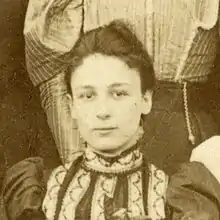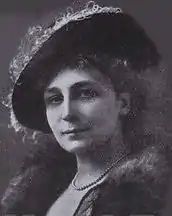Maud Adeline Cloudesley Brereton | |
|---|---|
 | |
| Born | 19 May 1872 |
| Died | 16 April 1946 |
Maud Adeline Cloudesley Brereton (1872 – 1946), formerly Horobin, née Ford, was a British feminist and sanitary reformer who worked first in education and then as a promotional writer for the gas industry.
Personal life and education
Maud Adeline Ford was born on 19 May 1872 in Marylebone in London, the eldest child of Matthew Ford, a butler and house steward, and Ellen Catherine (née MacDonald). She was baptised in July 1872.[1]
She trained as a teacher at Hockerill College in Bishop's Stortford, Essex, and worked as headmistress of St Andrews Girls School in Willesden in 1893, then from 1894 as headmistress of Baroness Burdett-Coutts School in Highgate, both girls' secondary schools.[1] In 1897 she became resident tutor at Homerton College, Cambridge, marrying the principal, John Horobin, shortly thereafter.[2]
By the time of Horobin's early death in 1902, they had two daughters and a son. One of their daughters, Norah Horobin, went on to become a teacher and ended her career as headmistress of Roedean School.[2] Their son, Ian, became a Conservative Member of Parliament. Maud briefly served as acting principal at Homerton College until 1904, when she married Cloudesley Brereton, with whom she had two sons.[3] She was supportive of the women's suffrage cause.[4]
Career

It was as "Mrs M. A. Cloudesley Brereton" that she became known as a social and sanitary reformer, and the author of The Mother’s Companion (1909), a book of advice for modern wives which promoted equality within marriage. When the British Commercial Gas Association was founded in 1911, she became editor of their Gas Journal (1912–1932).[5] Much of her work was based on the concept of using gas and its technology to alleviate drudgery in the home as a way to improve the health of women and children.[5] She became a leading figure in the campaign for gas, rather than electricity, to be the main source of domestic power.[6] Brereton pushed the gas company managers to use and listen to the feedback from their lady demonstrators, as she believed that this would improve two-way communication between the consumers and producers of gas, and ensure that the domestic difficulties of customers could be factored into provision.[5] She also advised the gas companies to consult with "well-educated lady advisors".
In 1907 she was decorated as an Officier d'Academie by the French government for "services to International Public Health".[7][1] She was Chairman of the Association for Education in Industry and Commerce in 1923-4 and latterly President of the organisation.[7] She also became a member of the Royal Institute of Public Health and in 1926 became the first female Honorary Fellow of the Institution of Sanitary Engineers,[4][7][8] as well as being a member of the Institute of Journalists, vice president of the Society of Women Journalists.[3] She was an early member of the Women's Engineering Society and contributed articles and information to the journal The Woman Engineer in the 1920s.[8] She was a member of the Efficiency Club and served as its president in 1931-2.[1] She was also a member of the Soroptimists.[1]
She retired in 1932[7] and died in Norfolk on 16 April 1946.[4][1] She was buried at Briningham.[9]
Books
- The Mother’s Companion (1909)[10]
- The Future of Our Disabled Sailors and Soldiers (1917)
- Cooking by Gas (1930)
- Unemployed or Reserve? (1930)
References
- 1 2 3 4 5 6 Law, Cheryl. (2000). Women, a modern political dictionary. London: I.B. Tauris. ISBN 1-86064-502-X. OCLC 42835729.
- 1 2 "Maud Brereton". homerton250.org. Homerton College, Cambridge.
- 1 2 Anne Clendinning, Demons of Domesticity: Women and the English Gas Industry, 1889–1939 (Routledge, 2017), electronic edition (unpaginated). Preview available on Google Books.
- 1 2 3 Slack, Sue (15 September 2018). Cambridge Women and the Struggle for the Vote. Amberley Publishing Limited. ISBN 978-1-4456-8550-2.
- 1 2 3 Clendinning, Anne (1 September 2000). "'Deft fingers' and 'persuasive eloquence': The 'lady demons' of the English gas industry, 1888–1918". Women's History Review. 9 (3): 501–537. doi:10.1080/09612020000200254. ISSN 0961-2025.
- ↑ Gooday, Graeme (2008). Domesticating electricity: technology, uncertainty and gender, 1880-1914. London: Pickering & Chatto. ISBN 978-1-85196-975-3. OCLC 222542339.
- 1 2 3 4 "The Woman Engineer Vol 3". www2.theiet.org. Retrieved 6 June 2020.
- 1 2 "The Woman Engineer Vol 2". www2.theiet.org. Retrieved 6 June 2020.
- ↑ "Find a grave". Find a Grave.
- ↑ "The mother's companion". 1909.